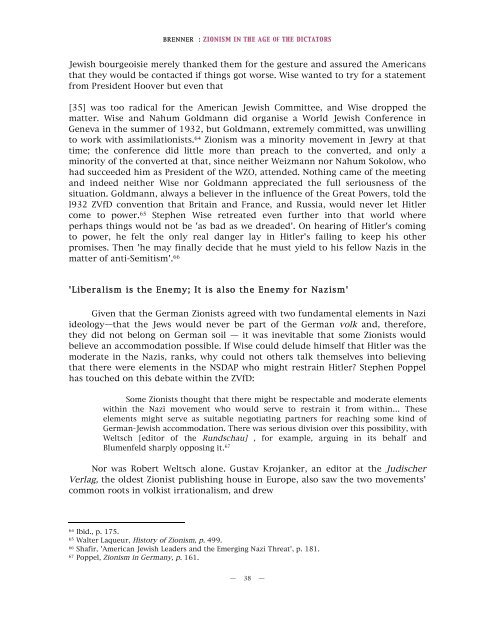You also want an ePaper? Increase the reach of your titles
YUMPU automatically turns print PDFs into web optimized ePapers that Google loves.
BRENNER : <strong>ZIONISM</strong> <strong>IN</strong> <strong>THE</strong> <strong>AGE</strong> <strong>OF</strong> <strong>THE</strong> <strong>DICTATORS</strong><br />
Jewish bourgeoisie merely thanked them for the gesture and assured the Americans<br />
that they would be contacted if things got worse. Wise wanted to try for a statement<br />
from President Hoover but even that<br />
[35] was too radical for the American Jewish Committee, and Wise dropped the<br />
matter. Wise and Nahum Goldmann did organise a World Jewish Conference in<br />
Geneva in the summer of 1932, but Goldmann, extremely committed, was unwilling<br />
to work with assimilationists. 64 Zionism was a minority movement in Jewry at that<br />
time; the conference did little more than preach to the converted, and only a<br />
minority of the converted at that, since neither Weizmann nor Nahum Sokolow, who<br />
had succeeded him as President of the WZO, attended. Nothing came of the meeting<br />
and indeed neither Wise nor Goldmann appreciated the full seriousness of the<br />
situation. Goldmann, always a believer in the influence of the Great Powers, told the<br />
l932 ZVfD convention that Britain and France, and Russia, would never let Hitler<br />
come to power. 65 Stephen Wise retreated even further into that world where<br />
perhaps things would not be 'as bad as we dreaded'. On hearing of Hitler's coming<br />
to power, he felt the only real danger lay in Hitler's failing to keep his other<br />
promises. Then 'he may finally decide that he must yield to his fellow Nazis in the<br />
matter of anti-Semitism'. 66<br />
'Liberalism is the Enemy; It is also the Enemy for Nazism'<br />
Given that the German Zionists agreed with two fundamental elements in Nazi<br />
ideology—that the Jews would never be part of the German volk and, therefore,<br />
they did not belong on German soil — it was inevitable that some Zionists would<br />
believe an accommodation possible. If Wise could delude himself that Hitler was the<br />
moderate in the Nazis, ranks, why could not others talk themselves into believing<br />
that there were elements in the NSDAP who might restrain Hitler? Stephen Poppel<br />
has touched on this debate within the ZVfD:<br />
Some Zionists thought that there might be respectable and moderate elements<br />
within the Nazi movement who would serve to restrain it from within… These<br />
elements might serve as suitable negotiating partners for reaching some kind of<br />
German-Jewish accommodation. There was serious division over this possibility, with<br />
Weltsch [editor of the Rundschau] , for example, arguing in its behalf and<br />
Blumenfeld sharply opposing it. 67<br />
Nor was Robert Weltsch alone. Gustav Krojanker, an editor at the Judischer<br />
Verlag, the oldest Zionist publishing house in Europe, also saw the two movements'<br />
common roots in volkist irrationalism, and drew<br />
64 Ibid., p. 175.<br />
65 Walter Laqueur, History of Zionism, p. 499.<br />
66 Shafir, 'American Jewish Leaders and the Emerging Nazi Threat', p. 181.<br />
67 Poppel, Zionism in Germany, p. 161.<br />
— 38 —


